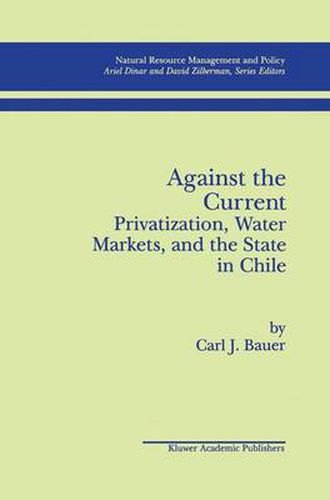Readings Newsletter
Become a Readings Member to make your shopping experience even easier.
Sign in or sign up for free!
You’re not far away from qualifying for FREE standard shipping within Australia
You’ve qualified for FREE standard shipping within Australia
The cart is loading…






This title is printed to order. This book may have been self-published. If so, we cannot guarantee the quality of the content. In the main most books will have gone through the editing process however some may not. We therefore suggest that you be aware of this before ordering this book. If in doubt check either the author or publisher’s details as we are unable to accept any returns unless they are faulty. Please contact us if you have any questions.
In 1981 Chile’s military government dictated a new Water Code that radically changed the country’s previous water rights system by strengthening private property rights, favoring market incentives, and reducing state regulation. Against the Current: Privatization, Water Markets, and the State in Chile is the first empirical and interdisciplinary study of water markets in Chile, which is the leading international example of free market water policies.
Against the Current: Privatization, Water Markets, and the State in Chile challenges the glowing reports given by neoliberals in Chile and the World Bank, showing that the results of this economic experiment have actually been rather mixed. Within the agricultural sector the Water Code has worked fairly well, although the market incentives to conserve water have been ineffective and water rights trading has been less active than expected. The Code’s impact has been more negative at the level of river basins, where the institutional framework has revealed critical flaws in coordinating multiple water users and resolving conflicts.
Against the Current: Privatization, Water Markets, and the State in Chile combines law, political economy, and geography to analyze the disadvantages, problems, and wider contexts of water markets. This book will appeal to everyone interested in property rights, market-friendly environmental policies, the political economy of sustainable development, and the intersection of economics with law and institutions.
$9.00 standard shipping within Australia
FREE standard shipping within Australia for orders over $100.00
Express & International shipping calculated at checkout
This title is printed to order. This book may have been self-published. If so, we cannot guarantee the quality of the content. In the main most books will have gone through the editing process however some may not. We therefore suggest that you be aware of this before ordering this book. If in doubt check either the author or publisher’s details as we are unable to accept any returns unless they are faulty. Please contact us if you have any questions.
In 1981 Chile’s military government dictated a new Water Code that radically changed the country’s previous water rights system by strengthening private property rights, favoring market incentives, and reducing state regulation. Against the Current: Privatization, Water Markets, and the State in Chile is the first empirical and interdisciplinary study of water markets in Chile, which is the leading international example of free market water policies.
Against the Current: Privatization, Water Markets, and the State in Chile challenges the glowing reports given by neoliberals in Chile and the World Bank, showing that the results of this economic experiment have actually been rather mixed. Within the agricultural sector the Water Code has worked fairly well, although the market incentives to conserve water have been ineffective and water rights trading has been less active than expected. The Code’s impact has been more negative at the level of river basins, where the institutional framework has revealed critical flaws in coordinating multiple water users and resolving conflicts.
Against the Current: Privatization, Water Markets, and the State in Chile combines law, political economy, and geography to analyze the disadvantages, problems, and wider contexts of water markets. This book will appeal to everyone interested in property rights, market-friendly environmental policies, the political economy of sustainable development, and the intersection of economics with law and institutions.